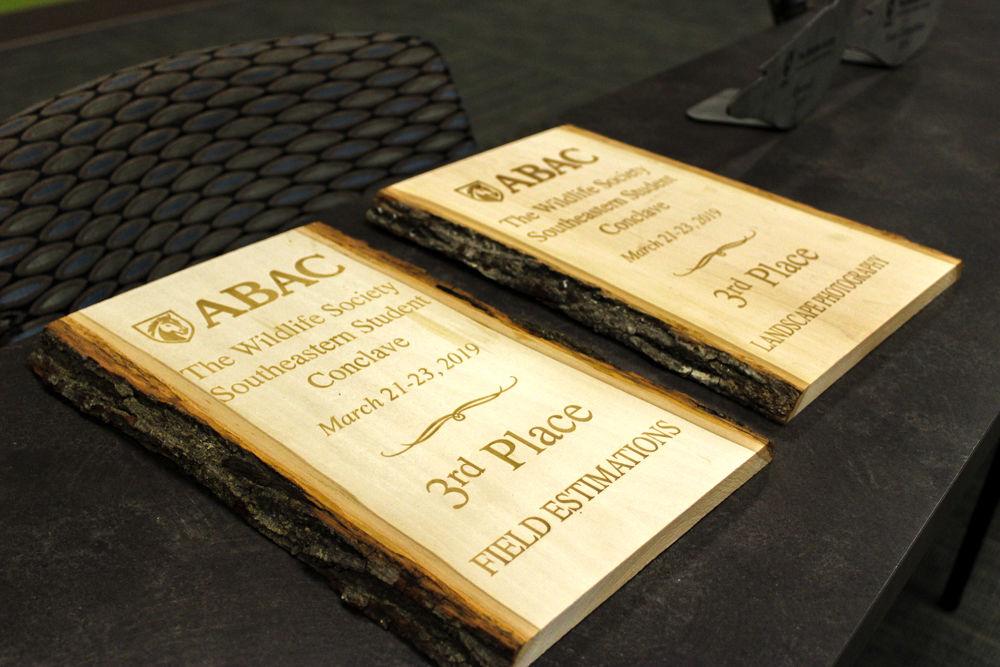
Marissa McHugh
The awards won at the recent Conclave competition sit on display at the Leopold Wildlife Club meeting in Jordan Hall on Monday, March 25. The club is open to all NC State faculty and students interested in wildlife conservation.
Wildlife conservation is a topic of growing importance as the planet gets warmer and extinction rates of the world’s most beloved species increase every year. As conservation gains relevance and more people learn what significance it has, there are more college students gaining interest in making a career out of it.
The Leopold Wildlife Club has shown the importance of wildlife conservation through hands-on activities and professional development. The group aims to emphasize the importance of wildlife conservation and expanding exploration of conservation methods. By exploring the field of conservation, students are also discovering possible research projects for them to pursue.
Austin Mueller, a fourth-year studying fisheries, wildlife and conservation biology and president of the Leopold Wildlife Club, spoke about the club’s main purpose.
“We provide opportunities for students in the wildlife-related fields to meet with professionals in the state commission and federal agencies to get the one-on-time with them,” Mueller said.
With the escalating interest in wildlife-related fields, many students are seeking careers related to the environment and what affects the human population has on it. Grasping the human impact on the environment has become more important due to the increasing population and resource usage which can negatively affect future generations.
Kyle Watkins, a fourth-year studying fisheries, wildlife and conservation biology and the education outreach officer for the Leopold Wildlife Club explains why he took a leadership position in the club.
“Environmental education has become an ever-increasing important part of wildlife,” Watkins said. “As more people get into more urbanized areas and away from nature, they start losing their touch with it.”
With environmental education becoming increasingly significant as human impact on the planet becomes clearer, more students are joining a workforce that’s changing the way we interact with the world around us. Watkins has recommended the Leopold Wildlife Club to all majors in wildlife-related fields in order to gain hands-on experience and professional development.
“I’ve gotten better about public speaking and outreach in general,” Watkins said. “Just going off of that, doing stuff like becoming a better leader and learning how to communicate better.”
By gaining skills such as public speaking and leadership, students are able to prepare themselves for wildlife-related careers. These skills also help in higher positions in wildlife conservation projects, therefore allowing students to be more prepared for these higher positions in the future.
“We’re the only club that actually focuses on wildlife management and land conservation,” Mueller said. “We are broad in the sense that we focus on almost all wildlife, and we can offer more hands-on activities to meet professionals.”
Networking has become essential for students who want to go straight to the workforce after completing college or get an internship during their college experience. Leopold Wildlife Club helps its members to meet professionals in these related fields, and they are able to learn more about wildlife-related careers, what it takes to work as a wildlife professional and places that are hiring recent college graduates.
“[The Leopold Wildlife Club] takes a more hands-on approach and now we’re trying to do more hands-on activities,” Watkins said. “Every year we get to participate in the southeastern section of the Wildlife Society Student Concave. Because of that, our club gets to go out there to different wildlife refuges and see how professionals get stuff done.”
Through a new perspective on the way the club should be run, the Leopold Wildlife Club provides an experience that allows those interested in wildlife-related careers to better understand the value of wildlife conservation.
More information about the Leopold Wildlife Club can be found on their Get Involved page.